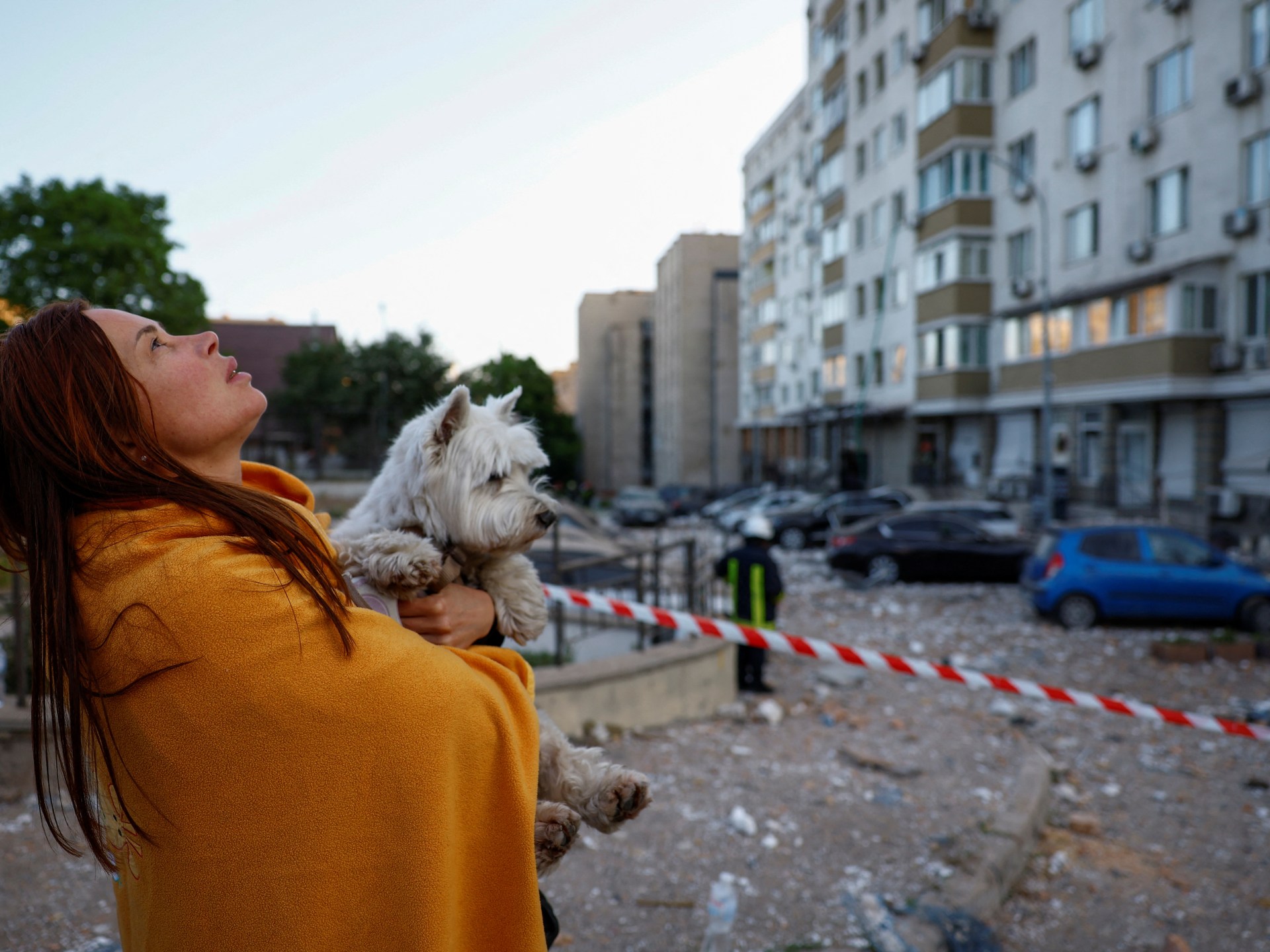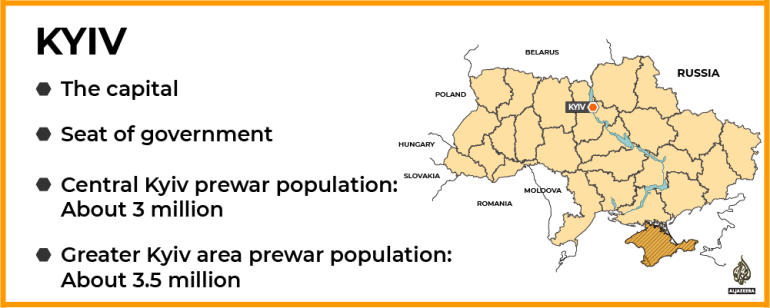Kyiv, Ukraine – A smoking piece of a Russian cruise missile fell just metres away from Lyudmila Lopashchenko near a book market in northern Kyiv.
The fragment belonged to an Iskander, one of the 11 hypersonic ballistic missiles Moscow launched on the Ukrainian capital on Monday morning, in a rare daytime attack.
Lopashchenko did not flinch, did not rush to the cool, breezy safety of a nearby subway station that has served as a bomb shelter since the Russia-Ukraine war began.
“We got used to it all,” the 57-year-old told Al Jazeera, as she waited for a bus in central Kyiv on Tuesday. “No one is hiding anymore.”
To her – and many others in the city whose pre-war population stood at 3.6 million – Tuesday was business as usual, even after Kyiv woke up to a fourth attack in just three days.
It was the 17th barrage this month in the Ukrainian capital as Moscow keeps changing tactics by varying the direction of attacks, the timing, and the number of cruise missiles and drones.
According to Ukrainian officials, some were fired from Russia’s Black Sea fleet in annexed Crimea, some from bombers and fighter jets that flow up in western Russia without entering Ukraine’s airspace and send their missiles low to avoid detection.
Moscow wants to “confuse and mislead our air defence”, air force spokesman Yurii Ihnat said in televised remarks on Sunday.
The results were painful.
A 33-year-old woman was killed on Tuesday morning – only because she came out to the balcony of her apartment in a high-rise building to watch the attack, Kyiv Mayor Vitali Klitschko said.
Thirteen more people were wounded, and the debris from shot-down drones and missiles caused fires in several apartment buildings and private houses, officials said.
To many Kyivans, the most harrowing sound that keeps them awake and horrified at night is the wailing of Iranian-made Shahed drones – that are mockingly dubbed “mopeds” here.
“It is so scary,” Olena Tkachenko, a nurse who lives on the 16th floor of a tall building in the Holosiivskyi distriсt in southwestern Kyiv, where destroyed Shaheds often fall, told Al Jazeera.
“I am much calmer at work” because her office is in central Kyiv, she said.
But then the wailing is drowned out by the louder, faster bangs of Kyiv’s air defence systems.
Their most precious part is a handful of advanced, United States-made surface-to-air Patriot missile systems. They can target planes, cruise missiles and shorter-ranger ballistic missiles such as Iskanders – and their whereabouts are top secret.
The White House agreed to supply Patriots to Ukraine in October, and Germany and the Netherlands soon followed suit by sending their slightly older systems to Ukraine.
Their collective decision maddened Moscow – especially after Patriots showed overwhelming success.
On May 4, they managed to shoot down a Kinzhal (“Dagger”), Russia’s newest hypersonic air-launched ballistic missile.
Russian President Vladimir Putin unveiled them with much pomp in 2018, calling them “super weapons” whose speed exceeds that of sound 10 times.
“Their power can be enormous, and their speed makes them invulnerable to today’s missile defence and air defence systems,” Putin said at the time.
In the hands of the Ukrainian military, the Patriots proved Putin utterly wrong, defence analysts say.
“Putin personally presented them as an invulnerable weapon that can’t be shot down and hits the target 100 percent of the time,” Lieutenant General Ihor Romanenko, former deputy chief of the General Staff of the Armed Forces of Ukraine, told Al Jazeera.
“Both claims were disavowed,” he said.
To many Ukrainians, the late-night bangs of Patriots symbolise the imminent victory over Moscow.
“They wanted to seize us, but they can’t overpower us,” Pavel Vichenskiy, a businessman from the town of Bila Tserkva some 80km (50 miles) south of Kyiv, told Al Jazeera.
The 38-year-old didn’t always think that way.
When he woke up to the sound of explosions on February 24, 2022, the war’s first day, he thought Russia would seize Ukraine – because of Ukraine’s endemic “corruption” that weakened its armed forces and defence capabilities, he said.
But by late March, Moscow withdrew its badly battered troops from around Kyiv and all of northern Ukraine – and he understood Ukraine would not fall.
More than a year later, an observer compares today’s stoicism to the final, fifth stage of the Kubler-Ross model of overcoming grief.
“During the war’s first stage, there was denial. Then anger. Every shelling caused anger: ‘How can they do it!’” Aleksey Kushch, a Kyiv-based analyst, told Al Jazeera.
“Then came bargaining: if we don’t respond, maybe they will bomb us less. Then there were depression and apathy. Now, there is acceptance. Just like the coronavirus, ageing, cold, heat – an external factor one has to co-exist with,” he said.
Tuesday brought news about Ukraine’s possible response to the question Kyiv’s mayor asked a day earlier.
“If the Russians can make Kyiv a nightmare, why do the people of Moscow rest?” Mayor Klitschko asked rhetorically.
A day later, at least eight attack drones struck residential areas in Moscow, damaging buildings along the central Leninsky Avenue.
The Kremlin sugar-coated the news.
“We’re talking about the response of Kyiv’s regime to our very effective strikes on one of their decision-making centres,” Kremlin spokesman Dmitry Peskov said.
But to the founder and owner of the Wagner Group private military force, the development was catastrophic.
“You stinking critters, what are you doing?” Yevgeny Prigozhin asked on Telegram in an expletive-ridden rant addressing the Russian Defence Ministry.
And Ukrainian officials habitually denied their role in the attacks – and trolled the Kremlin.
“Perhaps, not all drones are ready to attack Ukraine and want to return to their creators and, correspondingly, ask questions [such as] ‘Why are you sending us on Ukrainian children, on Kyiv and so on?’” President Volodymyr Zelenskyy’s aide Mykhailo Podolyak said in televised remarks.



